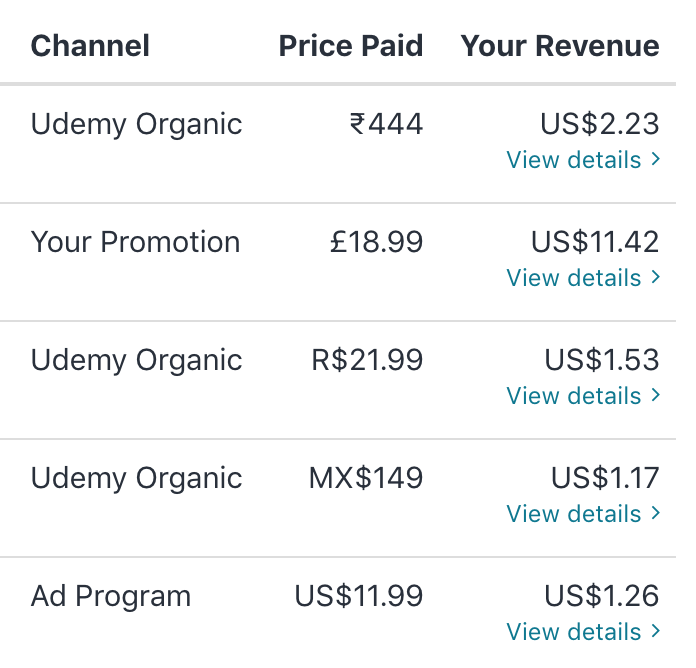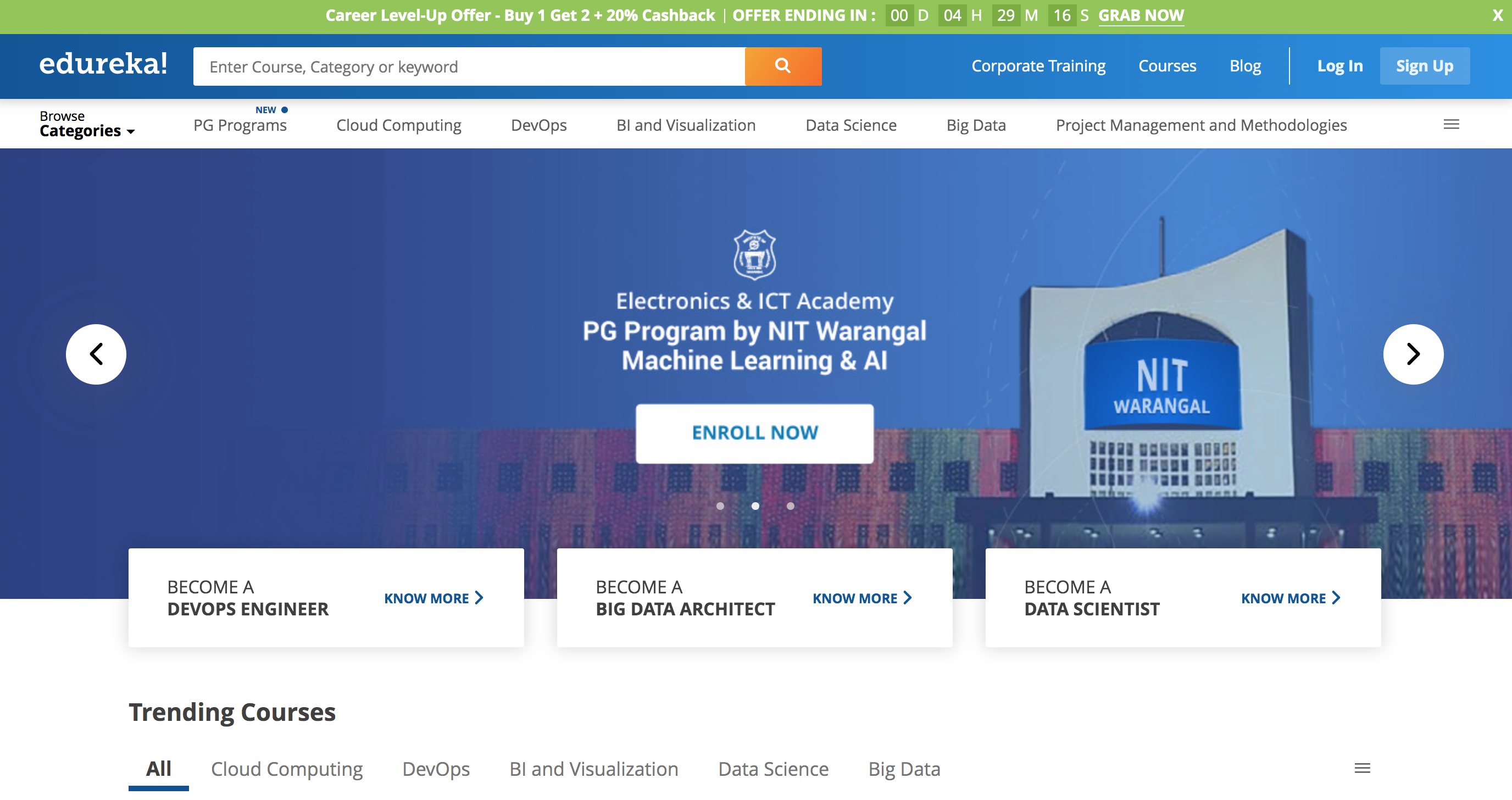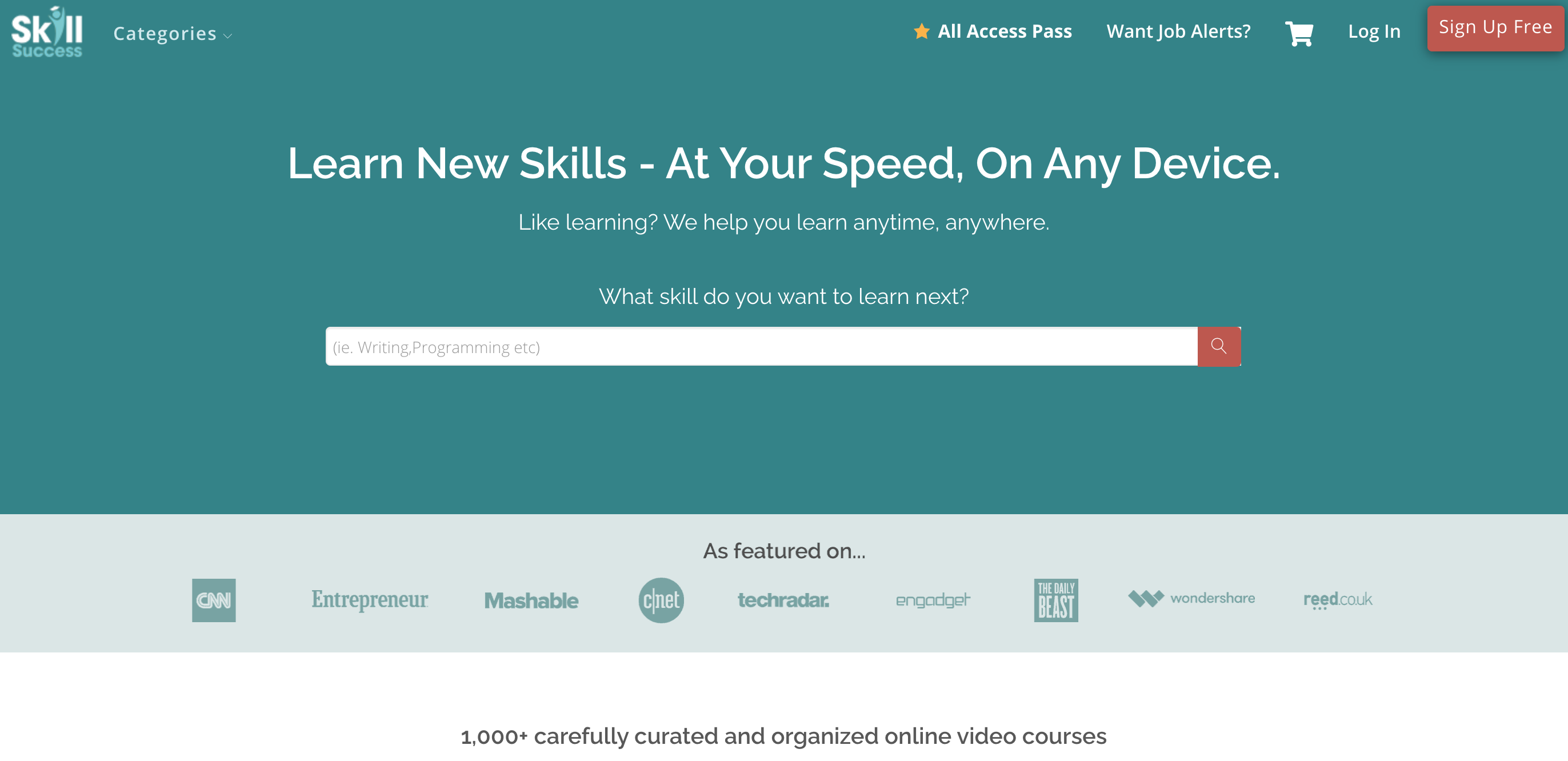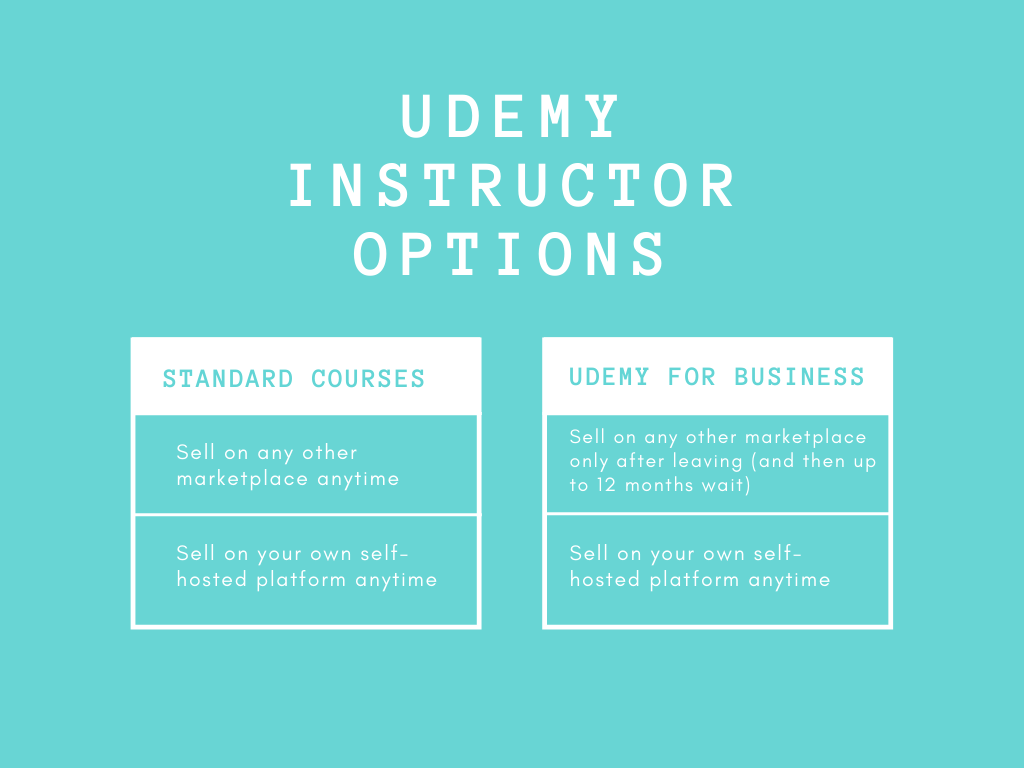Genuine Alternatives to Udemy for Instructors - Datasheet

This post originally appeared on the CourseMaker blog
Every Udemy course instructor who has been on the platform for more than a few months has had that sinking feeling - You know the one: looking at how much you are earning per student and realize that it's...a tiny fraction of the course price on average:

Seeing these kinds of numbers feels like a punch in the gut.
Having said that, there's no denying that Udemy's status as an elearning marketplace offers value to course instructors and a convenient learning experience for students.
There are millions of students on Udemy. Having access to a large pool of students can free up instructors from a lot of marketing work which
can leave many instructors feeling like they have no choice but to stick to Udemy.
The good news is that there are many alternative marketplaces where you can sell your courses. In some cases, these can be in addition to or instead of Udemy.
1. Skillshare
Alexa Global Traffic Rank: ~1,600
Skillshare is the largest Udemy alternative but has some important differences.
In 2018, when the platform closed its 28 million series C round of funding, it had
over 5 million users
In 2019, during a Yahoo Finance interview, the Skillshare CEO Matt Cooper said the platform had
8 thousands teachers [...] and about 26000 classes
He also noted in the same interview that:
Skillshare does not cover coding [...] it's not our core competence
Skillshare focuses more on creative (but still practical) skills such as design, drawing, painting, photography, marketing, and animation. There is also a strong set of business courses.
Crucially, Skillshare courses tend to be relatively short. This is likely to be due to the subscription business model (so students aren't gauging their "bang for the buck" on course length like they are on a site like Udemy). It does have some knock-on effects though since it means Skillshare courses tend to go into less depth than some of their longer Udemy equivalents.
Skillshare Course Instructor Payments
Skillshare costs students $15 per month for a subscription (or $99 billed annually).
The consequence of the subscription business model for instructors is that they earn revenue through royalty payments. This means that teachers will receive payment based on the number of minutes of their class watched by Skillshare's paying students.
Each month, 30% of Skillshare’s total Premium Membership revenue goes to a royalty pool for teachers. [...] Teachers are paid from the royalty pool based on their share of the minutes watched by Premium students (both paying members and those in free trials) across the platform each month
Source: Skillshare teacher's handbook
What appeals to me about this business model is that teachers are rewarded for creating materials that keep students engaged.
Due to its subscription model, instructors used to Udemy's marketing tools (such as coupons) may find themselves feeling more limited, Skillshare offers $10 for every new student who signs up through your referral link.
2. Skillwise

Alexa Traffic Rank: ~15000 (average across partner sites)
Skillwise is part of the Stack Commerce umbrella. It is not to be confused with the BBC's skillwise website.
Confusingly you apply to be an instructor via the
Stack Commerce form
To become a course author you simply apply, there are limited barriers to entry.
Skillwise boasts >600,000 students on its platform.
One important point to note, however, is that the course content on the platform is limited to the following broad areas:
- Software Development
- Design
- IT + Security
- Business
- Photography
Skillwise Instructor Payments
For courses sold organically on StackCommerce sites (such as Skillwise,
stackskills, and stacksocial) then you get 50%:
As per the instructor terms and conditions
Instructors will earn an Instructor Revenue Share for any Course sold on StackCommerce's
Direct Sites of fifty percent (50%)
For sites sold through "partner" sites, you get 20%:
When a Partner Site sells Your Course, Your Instructor Revenue Share will be adjusted to twenty percent
(20%) of the Net Sale Amount
And similar to Udemy (although actually worse for instructors), if a course is sold as a result
of paid ads (e.g. Google AdWords / Facebook Ads) then they take a whopping 90%:
"Paid Advertising." Instructor Revenue Share will be adjusted to ten percent (10%)
3. Edureka

Alex Global Traffic Ranking: ~3,200
Edureka has rapidly grown in recent years. Whilst it still has more than 50% of its traffic
from India, it is growing internationally.
Becoming an instructor involves filling in a form and then undergoing training based on "Edureka's Learning Methodology"
Anyone who has an in-depth working knowledge of the particular domain and is very passionate
about teaching and sharing his/her expert knowledge with students and professionals can
teach at Edureka. Good oral communication skills are mandatory.
The model of delivery for Edureka is a little different from the other marketplaces here, as students have the option to go into timed cohorts (similar to online classes or training courses). The idea is that Edureka puts students into these batches in order to improve the usually pretty-poor online course completion rates.
Edureka Instructor Payments
Edureka negotiates separate payment agreements with different course instructors which may work for or against you depending on factors such as your experience, location, and reputation.
4. Skills Success

Alexa Global Traffic Ranking: 81,935
Course creators might also want to consider Skills Success
The process here is to provide a link to the course (easy to do if you're already on Udemy, for new authors I guess you provide a link to the videos). They then get back to you within 3 days.
Niche Marketplaces
For those with specific skills (which is a lot of people on IndieHackers), it might also be worth looking at these niche sites:
Coding
- egghead.io
- Makerpad
- Codecademy note that they are a little different
in that employees create their courses
Marketing
CXL Institute
Design
Phlearn
Creative Live
Compliance
360 Training
Prestigious Marketplaces (e.g. Coursera)
Note that so far I've deliberately not mentioned some of the big names you might already be familiar with such as Coursera or Khan Academy. This is because many of these have Udemy alternatives have a barrier to entry that many Udemy instructors will not be able to meet:
- Coursera: Requires you to be an instructor at a world-class university. Typically, there are free courses with the ability to "audit" them for a fee.
- Udacity: Requires a detailed application, 5+ years of experience, and commitment to 15-20 hours per week. You need to ensure you are applying to teach a subject of interest
- Pluralsight requires "short audition video" and generally is quite selective, although if you are knowledgable about a
particular technical niche you should give it a shot. - LinkedIn Learning (formerly Lynda.com)
- Learning.ly - similar to Pluralsight, these guys expect at least one of the following (1) Field experience (2) Awards or distinctions or (3) Track record of presenting at important industry events
Note that if you do qualify for any of the above, and are able to meet the high quality bar that most of them set, they can be a great option.
To give you a feel for their size:
- Pluralsight has 6500+ courses
- LinkedIn Learning: With more than 5,000 courses
These online learning platforms do tend to pay authors more (although this is subject to factors such as the amount of time students spend on an author's course)
Understanding Udemy Terms and Conditions
A common question from Udemy instructors looking around at alternatives is "Am I allowed to put my course on another marketplace?" The answer is yes, as you can see from this support answer
Udemy's marketplace model means that when you publish a course on our platform, you retain all the rights to your content
Note that this is a little different if your course is part of the more selective "Udemy for Business" program. If this is the case, then if you want to sell your course on another marketplace you need to "terminate your participation in the Udemy for Business Program" (which you can do at any time). The key thing to note is that the terms and conditions say:
Udemy will remove your courses from the Collection within 12 months of termination
Which is deliberately vague. In theory, this means that you are obliged not to sell your course on another marketplace for up to 12 months, depending on how long Udemy takes to withdraw the course.
Crucially, for Udemy for Business authors, there are no restrictions on selling on your own platform.
In section 2.4 of the Udemy Promotions Policy
it states:
Once your course is included in the Collection, you agree that you will not begin to offer any pre-recorded courses
that directly compete with or injure the sales of that course on any site or platform other than your own
Note the qualification "any site or platform [...] other than your own"
This does give you the flexibility to offer your course on your own platform.
Here is a summary of your options:

Naturally, if you opt to sell your course on alternative platforms you need to manage your pricing accordingly: Students will not be delighted to discover they could have got your course cheaper on a different marketplace - these are the unwritten rules of ecommerce.
Sell on your own site vs. another marketplace
Broadly speaking, there are two main types of online learning platforms:
- Other marketplaces (what we have discussed so far)
- Self-hosted sites
A Google search will reveal many options for online course self-hosting such as:
- Teachable
- Thinkific
- Kajabi
- Podia
- CourseMaker
- Various open-source LMS projects and WordPress plugins
With any of these online course builder options, there are a lot of new things to consider:
- transaction & hosting fees
- membership sites
- setting up payments (e.g. with Stripe or Paypal)
- optimizing sales pages
- running webinars
- marketing - particularly content and email marketing as well as social media
In short, you have to "go it alone". Whilst taking this path to sell online courses means the burden
of the marketing falls on you, this can be a really powerful way to take full control of your online course
business and course creation process.
We have detailed posts explaining:
- How to choose whether or not to use an online course platform or go with a marketplace
- Your options for self-hosting
Which Marketplace Is Right For You?
If you have 5+ years of relevant industry experience and/or a track record in an in-demand field, it might be worth giving the more selective platforms (Pluralsight, Udacity, Linkedin Learning) a shot. For those working in universities, Coursera or EdX might be an option.
For course creators looking to easily replicate existing Udemy success, the best
alternative place to sell courses is Skillshare, with Edureka and Skillwise also worthy of consideration. If you're in a more niche field, or you worry that the existing competition is too entrenched, some of the smaller players listed above might be better options.
If you are more entrepreneurial, then setting up your own course website
could be your best bet.
Quite a long one - but hopefully that helped!

Wow, this is an amazing post. Thank you so much for putting this out Chris!
Great post! However, your forgot to mention that if you sell your stuff yourself on UDEMY you will keep 97% of the fees. Which makes UDEMY both the platform with the biggest cohort of students and a great place to sell yourself your courses.
I mean, if you create your platform, you will not do better than selling only yourself.
The main constraint on UDEMY is the way they handle course prices, there are so many promotion that most courses are sold at 9,99€ or $
Thanks 😀
True about the 97% - although you have to keep up with the coupon regeneration (they all now expire after one month). I think the other aspect to consider is the control of your business model (e.g. if you want to create a subscription business) and owning your email list.
Of couse you could also opt for publishing content on more than one platform subject to T&C of the platforms. For example, I believe on Udemy, you have to make sure to not offer the content for their business plan which makes the whole content exclusive to Udemy only.
Hey Chris, I thought this was a fantastic in-depth analysis to course hosting platforms!
Funnily enough, I've spoken to this person who had 50k students on Udemy, but only made enough for small pocket money each month (~$500).
It works for some people and they're great for discoverability, but definitely, it's worth looking into different platforms out there!
I'm surprised you didn't put any audio course hosting platforms as well, just wondering why.
Thanks! Yeah, it's a familiar story with Udemy authors making surprisingly little (I assume you mean $500).
Which audio course hosting platforms are out there? I don't think I've come across any
Hey Chris, oops I meant $500! I've just changed it for future reference hahaha.
[Kinda bias] but I work for AViD FM who are focused more on supporting creators through audio lessons, but there are other ones on the rise as well like Knowable. I think they're looking for more established, seasoned creators through. They're like the Teachable of the video course creation world, I guess.
There are also others but I fear I'd be called out by my colleagues here once I start chatting about it! But yeah, I just wondered why you didn't mention them. Do you think there's a market for audio learning after comparing all these platforms? Or do you think the future would still be video?
Interesting - this was an angle I'd not really considered. I guess audio was the original form for the "not in person" self-paced education courses. The cassette tapes of the 80s/90s.
I'm sure there is a market for this - but probably more for certain types of courses. Like I can see this working well for motivational or "self-help" courses, but less well for say Linear Algebra, where you really need visuals too.
In the long run, my guess is we'll see more of convergence on what actually works. Watching videos alone is not sufficient - problem-solving, live exercises, and full projects are required. Whichever medium can best deliver that is the one that will thrive, but there will be many user preferences.
Great! I'm going to share this in a future issue of Course Creators Weekly! 🙂
Please do :)
Thanks for your research into this.
I worked at Pluralsight and Udacity. A couple important details about the author experience.
Small note: LinkedIn Learning acquired Lynda, not Pluralsight.
Thanks very much for sharing your insight - great points (have fixed that Lynda error).
For an author with a strong skillset would you go with Udacity or Pluralsight?
Tough call, there are so many factors to consider. I should probably write a post about that :)
Some initial thoughts:
Incredible insight on course platforms comparison and also appreciate the idea of self-hosting. Thanks for sharing!
Thank you 😀
Amazing post. We have bookmarked as it has given our team a lot to think about.
Just by the way of introduction, we are working on Tutorpass (https://www.tutorpass.io/), an VERY early-stage product which is focused on resolving the issue of course engagement and completion seen on incumbent platforms.
It is a pretty crowded space, but our niche is the behavioural science aspect of it. Many of these attention-grabbing tricks found on social media apps take advantage of our brain's dopamine system. We want to make those design patterns accessible to a course creators workflow. How can we light up the same reward neural pathway whilst learning?
If anyone is interested, then please connect with us. We would love to hear about your experience on course hosting platforms to date.